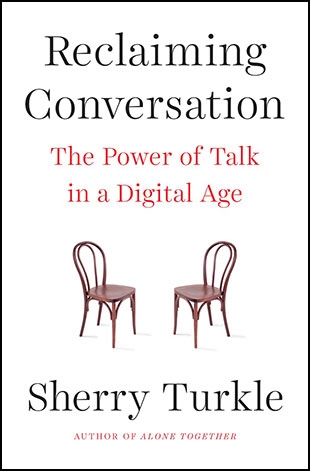"As I was concluding work on this book I attended a large international meeting that had a session called "Disconnect to Connect." There, psychologists, scientists, technologists, and members of the business community considered our affective lives in the digital age. There was widespread agreement that there is an empathy gap among young people who have grown up emotionally disconnected while constantly connected to phones, games, and social media. And there was much enthusiasm in the room for how technology might help. Now, for people who show little empathy, there will be 'empathy apps' to teach compassion and consideration. There will be computer games that will reward collaboration rather than violence.
"The idea is that we've gotten ourselves into trouble with technology and technology can help us get out of it. It's that image of the cavalry. Where we once dreamed of robots that would take care of our physical vulnerabilities, now apps will tend to our emotional lapses. If we have become cold toward each other, apps will warm us. If we've forgotten how to listen to each other, apps will teach us to be more attentive. But looking to technology to repair the empathy gap seems an ironic rejoinder to a problem we perhaps didn't need to have in the first place.
"I have said that it is easier to build an app than to have a conversation. When I think of parents who are drawn to their email instead of a dinner conversation with their children, I am not convinced that there is a technological fix for the emotional distance that follows. Yes, we should design technology to take account of our vulnerabilities – those phones that release us rather than try to hold us – but to bridge the empathy gap, I think of things that people can do. I think of parents who experiment with sacred spaces and technology time-outs to reclaim conversation with their children and each other. I think of the college students and CEOs who put their phones away to pay full attention to friends and colleagues. I think of the new enthusiasm for meditation as a way to be present in the moment and discover the world we hold within. When people give themselves the time for self-reflection, they come to a deeper regard for what they can offer others.
"The moment is right. We had a love affair with a technology that seemed magical. But like great magic, it worked by commanding our attention and not letting us see anything but what the magician wanted us to see. Now we are ready to reclaim our attention – for solitude, for friendship, for society.
"Caring machines challenge our most basic notions of what it means to commit to each other. Empathy apps claim they will tutor us back to being fully human. These proposals can bring us to the end of our forgetting: Now we have to ask if we become more human when we give our most human jobs away. It is a moment to reconsider that delegation. It is not a moment to reject technology but to find ourselves.
"This is our nick of time and our line to toe: to acknowledge the unintended consequences of technologies to which we are vulnerable, to respect the resilience that has always been ours. We have time to make the corrections. And to remember who we are – creatures of history, of deep psychology, of complex relationships. Of conversations artless, risky, and face-to-face."
